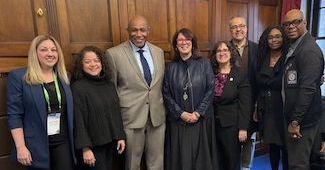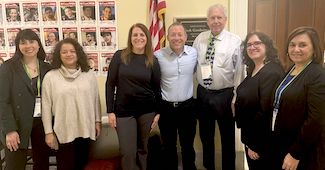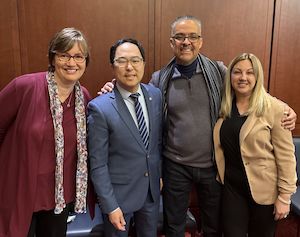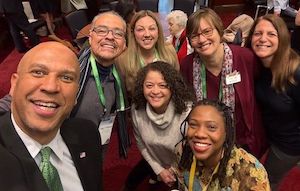Site Search
- resource provided by the Forum Network Knowledgebase.
Search Tip: Search with " " to find exact matches.
Already, 2025 has been a year unlike any other. The changes in federal policy are coming at a pace we’ve not experienced before. Not even a month in, the new administration immediately issued several significant Executive Orders (EOs), creating uncertainty across the social sector. From attempts to freeze Congressionally approved funding, to efforts banning diversity, equity, and inclusion programs, and questionable tactics to slash the federal workforce; funders and nonprofit partners are gravely concerned about how the fabric of our democracy and the systems of constitutionally mandated checks and balances are fraying right before our eyes. To help you cut through the noise, the National Council of Nonprofits is tracking and continuously updating its analysis of the impact of these EOs on nonprofit organizations in real time.
This is the time to shore up relationships with colleagues and nonprofit partners. I’m grateful that in New Jersey, we have a strong partnership with the New Jersey Center for Nonprofits. Advocacy and policy are at the heart of the Center’s mission. They have been at the forefront of keeping us informed about the Office of Mangement and Budget's (OMB) freezing of federal grants and loans. I encourage you to:
- Sign up for the Center’s email list for up-to-date, reliable information.
- Ask your grantees and nonprofit partners to complete the annual NJ Trends and Outlook survey, launched today. This year, the survey is also collecting stories about how executive actions are impacting nonprofit organizations.
On behalf of philanthropy-supporting organizations, United Philanthropy Forum is also mobilizing to serve as a key source for accurate, reliable information with their newly created resource page, “Executive Actions Impacting the Philanthropic & Nonprofit Sectors."
Funders across the country are asking what they can do immediately. As I noted above, leveraging your partnerships and strengthening your relationships is key. Echoing sage recommendations from the Council on Foundations and Grantmakers for Effective Organizations, here are other strategies for your consideration:
- Reach out to your grantees and nonprofit partners – don’t wait for them to reach out to you. They need to hear from you and know that you are championing their often-thankless work.
- Offer flexible funding and move funding quickly. Allow your grantees to repurpose their current grant funding to meet the needs of their organization and those they serve. Giving nonprofits every resource and tool they need to be nimble is critical.
- Share your funding opportunities with the New Jersey Center for Nonprofits to post on their revamped funding page.
- Get comfortable introducing your grantees to new partners, other grantees, and potential funders. This is how we build strong, resilient communities of practice and service.
We’re embarking upon untested times. As we celebrate Black History Month and Women’s History in March, it is important to remember that meaningful change starts and ends with partnership, collaboration, and advocacy. Philanthropy has a critical role to play in this equation.
To help you better understand the federal policy landscape, we’re hosting an eight-part Funder Briefing Series: Making Sense of Federal Policy: Understanding What it Means for
New Jersey, beginning in March. This series will provide an overview of key issues that directly impact philanthropy, and more broadly, the charitable sector. The first session, on March 13 at 4:00 pm., will focus on immigration.
In addition, we will be launching a web page with information and resources to help inform your decision-making, as well as reintroducing our policy infused e-newsletter, CNJG ...for the field. Covering both big 'P' and little 'p' policy issues, the first edition will land in your inbox later this month, providing key updates and relevant articles.
I want to end with some exciting news — Craig Weinrich has been promoted to Senior Director, Member Experience. Craig has been with CNJG for 11 years, and his leadership and dedication have been invaluable to our community. Please join us in congratulating him on this well-deserved promotion!
promoted to Senior Director, Member Experience. Craig has been with CNJG for 11 years, and his leadership and dedication have been invaluable to our community. Please join us in congratulating him on this well-deserved promotion!
And channeling Craig – a quick reminder: it’s time to renew your CNJG membership. Please reach out to him if you have questions.
We look forward to engaging with you in the months ahead. Philanthropy has an important role during these tenuous times. Let’s use our collective power for good.
In solidarity,
Theresa Jacks, President and CEO
Council of New Jersey Grantmakers
Hosted by United Philanthropy Forum, in partnership with the Council on Foundations and Independent Sector, Foundations on the Hill (FOTH) is an annual opportunity for foundation executives, staff, and board members, philanthropy-serving organizations, and other philanthropic and social sector leaders to meet with their federal lawmakers, talk about issues of interest to philanthropy, and strengthen relationships with their representatives.
The overall purpose of Foundations on the Hill is to:
- Inform and educate Congress about philanthropy
- Advocate on issues affecting foundations
- Build CNJG’s relationships with lawmakers and their staff
- Create visibility for foundations and philanthropy on Capitol Hill
- Encourage Congress to view foundations as resources on key public policy issues
CNJG Makes Strong Showing at Foundations on the Hill 2025
The Council of New Jersey Grantmakers joined over 350 colleagues nationwide at Foundations on the Hill (FOTH) from February 23rd to 26th. This premier policy conference brought together the philanthropic sector for advocacy and education.
The CNJG delegation, led by our President and CEO Theresa Jacks, included Board Chair Craig Drinkard, Executive Officer, Victoria Foundation, Policy Co-chairs, Lucy Vandenberg, Executive Director, The Schumann Fund for New Jersey and William Engel, President, The Union Foundation, as well as a diverse group of foundation leaders representing various regions and interests across New Jersey. Notably, Linda Czipo, President and CEO of the New Jersey Center for Nonprofits, also participated, providing valuable insights from the nonprofit perspective.
FOTH offered a rich program beyond meetings with legislators. Attendees participated in conference sessions, learned about key national trends in philanthropy, and engaged with experts on critical issues like equitable grantmaking, tax reform, and the budget reconciliation process.
The CNJG delegation met with all New Jersey Congressional and Senate offices, including meeting directly with Congressmen Josh Gottheimer and Herb Conaway, and Senator Andy Kim, along with a photo meet-up with Senator Cory Booker. They advocated for the bipartisan Charitable Act, H.R.801/S.317). These bills modify and extend the deduction for charitable contributions for individuals who do not itemize deductions on their tax returns, thereby incentivizing charitable giving and encouraging greater philanthropic support for nonprofits and the communities they serve.
Beyond policy discussions and sharing what is happening on the ground in our state’s communities as a result of executive actions, FOTH provided valuable networking opportunities. The annual CNJG dinner fostered connections and relationships within the delegation, as well as time to debrief about what we were hearing on the Hill. Special thanks to Jermey Grunin, President, Grunin Foundation and Bill Engel for underwriting our dinner!
Overall, CNJG's participation in FOTH proved successful. By advocating for key legislation, educating Congress, and building relationships, CNJG helps ensure the voice of New Jersey philanthropy is heard on Capitol Hill.
2025 CNJG Delegation:
Carrie Bersak, Program Officer, The Burke Foundation
Sharif Braxton, Director, EQUIP NJ
Naeema Campbell, Program Officer, The Fund for New Jersey
Linda Czipo, President and CEO, New Jersey Center for Nonprofits
Kortney Swanson Davis, President and CEO, Forman S. Acton Educational Foundation
Craig Drinkard, Executive Officer, Victoria Foundation
William Engel, President, The Union Foundation
Alma Garcia, Director, Equity Ahora
Jeremy Grunin, President, Grunin Foundation
Theresa Jacks, President and CEO, CNJG
Jessica Johansen, Manager of Portfolio and Strategic Operations, The Tepper Foundation
Sharnita Johnson, Vice President, Victoria Foundation
Jessica Nugent, Senior Program Officer, The Burke Foundation
Katherine Nunnally, CEO, Smith Family Foundation
Jonathan Pearson, Executive Director, The Horizon Foundation for New Jersey
Shelley Skinner, Managing Director of Portfolios, The Tepper Foundation
Nelida Valentin, Vice President, Grants & Programs, Princeton Area Community Foundation
Lucy Vandenberg, Executive Director, The Schumann Fund for New Jersey
Renee Woodside, Associate Director, The Horizon Foundation for New Jersey
Hellen Zamora-Bustos, Grassroots Community Advocate, Equity Ahora
We are pleased to share links to organizations and other resources that assist nonprofit with development, volunteer recruitment, and other key aspects of their work.
New Jersey Center for Nonprofits
The New Jersey Center for Nonprofits is the only umbrella organization for all New Jersey 501(c)(3)s. Since 1982, the Center has provided advocacy, resources, training and information to strengthen non-profits and help them thrive. The Center offers an active list of funding opportunities for NJ-based nonprofits. CNJG is partnering with the New Jersey Center for Nonprofits by sending any and all funding opportunities from our members and other funders to add to this page. Our goal is to make this page one of the first places New Jersey non-profits visit to find funding opportunities.
NJ Division of Consumer Affairs: Charities Registration Section
The CR & I Section administers and enforces the provisions of the Charitable Registration & Investigation Act (CRI Act) which regulates the fund raising activities of most charitable organizations and all professional fund raisers, fund raising counsels, commercial co-ventures and solicitors conducting business within the State of New Jersey.
New Jersey Philanthropy Hub
The New Jersey Philanthropy Hub, developed by Impala and launched in partnership with CNJG and the New Jersey Center for Nonprofits, brings the state’s giving landscape into clear view—empowering funders, nonprofits, and policymakers to strengthen communities, drive innovation, and build a more equitable future for all New Jerseyans. This free, open-access platform provides an unprecedented view of New Jersey’s nonprofit and philanthropic sector. Join us on October 23, 2025 at noon for the launch event of this new, helpful, and exciting tool!
Candid.org
The Foundation Center, now Candid.org, has launched Foundation Directory Online, a website you can use to search the basic profiles and IRS Forms 990-PF of nearly 90,000 grantmakers, giving them access to contact information, fields of interest, financial data, and program priorities. Registration is required. They offer a free version that gives basic information, or one can subscribe for a fee to access more detailed information.
Those seeking funds can also access a paid version of the Foundation Directory Online through Candid’s Funding Information Network access locations. There are several in New Jersey and in neighboring states.
Pro Bono Partnership
Pro Bono Partnership provides business and transactional legal services to nonprofit organizations serving the disadvantaged or enhancing the quality of life in neighborhoods in New York, New Jersey, and Connecticut.
Association of Fundraising Professionals, New Jersey Chapter
The Association of Fundraising Professionals fosters the professional development of fundraising professionals and promotes ethical standards in the fundraising profession. The New Jersey Chapter is an individual member association that advances philanthropy through education, training, and advocacy across the state, basing its programs and services on research, experience and the highest code of ethical principles and standards of professional practice.
Association of Fundraising Professionals, Southern Jersey Chapter
The Association of Fundraising Professionals NJ, Southern Chapter serves Atlantic, Burlington, Camden, Cape May, Cumberland, Gloucester, Ocean and Salem counties in the southern-most region of the state.
Grant Professionals Association
The Grant Professionals Association helps grant professionals seek to continually improve their professional knowledge and skills in grant research, proposal development, and post-award grant management. They provide a consultant directory to find assistance with preparing grant applications and proposals.
NJ Chapter of Grants Professional Association
The statewide chapter of the Grants Professional Association..
Resources
The Philanthropic Infrastructure landscape
The Council on Foundations put together this list of philanthropy-supporting organizations (PSOs) that engage philanthropy, share resources, increase trust in philanthropy, and improve our local communities.
Exploring the Social Sector Infrastructure
The Urban Institute created this microsite that details the infrastructure organizations that support the social sector.
Common Grant Application and Report Form
More than a decade ago, the Council of New Jersey Grantmakers and Philanthropy New York spearheaded a project to develop common application and report forms to help streamline the grant application process and ease the often time-consuming grant preparation process.
The Common Grant Application is a four-page form, which includes directions for use, a sample cover sheet, and the common grant proposal guidelines. The separate Common Report Form is accepted by many funders and helps to streamline the grant-app/report process. Please check with funders to see if they accept this documentation before sending.
If you know of other resources that you feel would be valuable to feature in this area, contact Theresa Jacks.
CNJG COVID-19 Liability Waiver for in-person events.
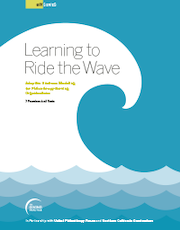
Developed in partnership with United Philanthropy Forum and Northern California Grantmakers, this guide shares seven practices and 12 tools for Philanthropy-Serving Organizations who seek effective ways to mobilize resources to sustain their organization’s work. The guide features perspectives from dozens of leaders of national and regional PSOs and examples from our work with these organizations. Much of the content is based on conversations and strategy work with PSO leaders, staff and board members.
A CNJG member queried our listserves on policies regarding: 1) number of vacation days for new full-time employees; 2) paid time off (PTO); and 3) working remotely. CNJG compiled the answers from responding members.
A corporate member queried the corporate listserve which technology tools they use for their corporate giving system/platform. CNJG compiled the responses and combined it with previous responses from other technology systems queries to create this list of “Who Uses What Technology Systems.” If your organization is not listed, please email the names of those systems to Craig Weinrich.
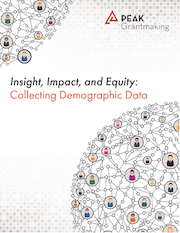
Grantmakers occupy a powerful space of privilege in the social change sector. As such, they have a unique opportunity—and responsibility—to work proactively toward equity and inclusivity. Increasingly, grantmaking institutions are challenging themselves to live their values through their grantmaking practices.
For philanthropy to advance equity in all communities, especially low-income communities and communities of color, it needs to be able to understand the demographics of the organizations being funded (and declined), the people being served, and the communities impacted. That data should be used to assess practices and drive decision making.
PEAK Grantmaking is working to better understand and build the capacity of grantmakers for collecting and utilizing demographic data as part of their grantmaking.
Prorated dues for Grantmakers joining after July 1 and future dues investment amounts.
This opinion piece is from Nina Stack, President of the Council of New Jersey Grantmakers.
NJ Civic Information Consortium awarded over $463,000 in grants for their first round of grantmaking in 2025.
Sample board committee descriptions, including roles and responsibilities of committee members
To answer the basic question of how many active family foundations are planning to spend down or exist in perpetuity (or have not yet made a decision), and to examine foundations’ motivations and decision-making, the Foundation Center, in collaboration with the Council on Foundations and with additional assistance from the Association of Small Foundations, launched a study of family foundations in 2008. This report presents the full range of study findings, which are based on survey responses from 1,074 family foundations.
PEAK Grantmaking is working to better understand and build the capacity of grantmakers for collecting and utilizing demographic data as part of their grantmaking. Their work is focused on answering four key questions:
- What demographic data are grantmakers collecting and why?
- How are they collecting these demographic data?
- How is demographic data being used and interpreted?
- How can funders use demographic data to inform their work?
With the help of Kelly Brown, former Executive Director of the D5 Coalition, and an advisory committee of grantmakers, PEAK has completed an expansive survey, interviews with grantmakers, and field research on these four questions.

